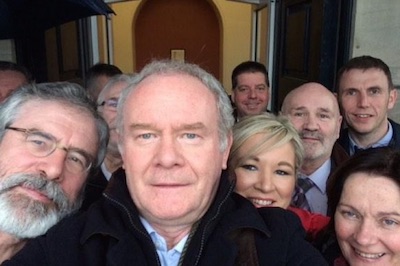
By Alex Kane (for Irish News)
It seems to me that there are three political/peace processes jostling for primacy here. The first is the ‘sure it’s better than it used to be’ process.
In other words it doesn’t matter how shambolic the exercise of government may be, or how removed it is from the public it is supposed to serve, it’s still deemed better than the bloodshed that preceded it.
At least that’s what the politicians tell us. Indeed it has become their stock response when anyone points out that the emperor is both naked and frozen to the spot.
The second is the illusion process, involving smoke, mirrors, sleight-of-hand, dead white rabbits and squashed doves.
The central feature of this one, though, is a never-ending requirement from Robinson and McGuinness to blame the media for spoiling the illusion by revealing that it’s all an act - and not even a particularly good act.
Robinson was at it again last week in west Belfast, giving newspapers a roughing-up for complaining about the flaws in the system, yet failing to mention that he was the one writing articles last autumn saying that the institutions were “not fit for purpose” and close to collapse. Sinn Fein didn’t disagree with his analysis.
And the third is the stick-to-what-we-do-best process, in which the parties continue to knock 10 bells out of each other, pick at scabs, rerun old battles and play entirely to their own galleries.
This one, of course, is the easiest process, because it is the real process. They really can’t stand each other. They really don’t want to work together (unless it is in the run-up to a White House junket or involves the whiff of cash from someone - and they’re not really fussy whom) and they really don’t want to share, let alone build a united agenda.
If they did want to share, then we would have seen some sort of evidence of it from the nature of the relationship between the DUP and Sinn Fein since May 2007.
But that relationship has always been fractious. We saw it again on Tuesday when Sammy Wilson accused Sinn Fein’s Megan Fearon of being like the brainwashed teenage girls who join ISIS, after she complained about a motion condemning the naming of a play park after Raymond McCreesh.
This is easy stuff. It doesn’t require any preparation or rehearsal. It’s just a matter of rising from your seat and baiting (“ah, sure it’s better than beating them” I can hear Pollyanna chirrup) each other. It’s lazy politics. It’s politics for dummies. It’s politics for people who can see no further than their own self-imposed limitations.
And it’s clearly what we’re going to get when the 11 new super-councils roll out in a few weeks time - April 1, for good measure. The ones with a nationalist majority will be trying to create ‘neutral’ space by banning poppies and writing the ban notices in Irish: while the unionists will want flags and flat-earth creationism. You thought one Stormont was bad? Just wait until you get 11 mini Stormonts, complete with their bite-sized lunacies and Balkanising planning policies. Better still, these mini-me structures will be dominated by Sinn Fein and the DUP and have greater powers than local government has had for almost 50 years.
The last councils were mostly restricted to bogs, dogs, bins and burials because the general assumption was that they weren’t ready to deal with the really big stuff.
Well, they’re still not ready to deal with it, yet they’ve been given the power. And given that power by the two parties who can’t stand the sight of each other.
What could go wrong?
I’ll leave you to work that out for yourselves.
Anyway, back to problem of the jostling processes. None of them are working. Two are based on self-serving delusion or illusion and the third is just the political version of ‘stitch and bitch’.
Robinson and McGuinness boast of the stability at the heart of whatever this process actually is, but I don’t see how you have stability in a system where compromise, cooperation and consensus are in such short supply and where neutral spaces are regarded as places to be captured and conquered.
I don’t deny that it’s better than it used to be. I don’t deny that the executive has chalked up some successes. But I am genuinely concerned with the growing opinion of far too many people that what we have is as good as it gets. That would be the worst process of all.
![[Irish Republican News]](https://republican-news.org/graphics/title_gifs/rn.gif)
![[Irish Republican News]](https://republican-news.org/graphics/title_gifs/harp.gif)

